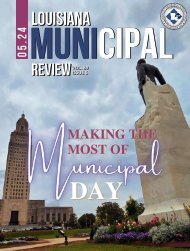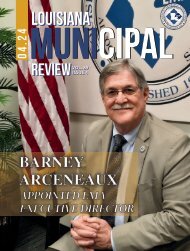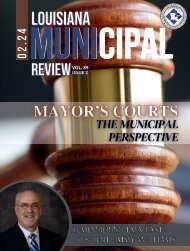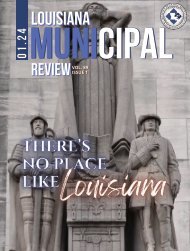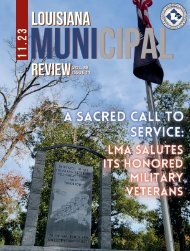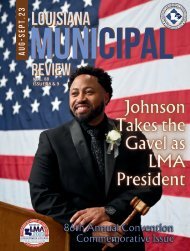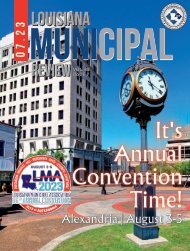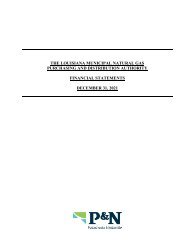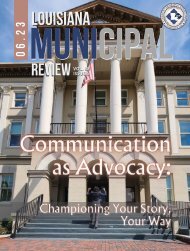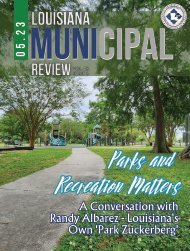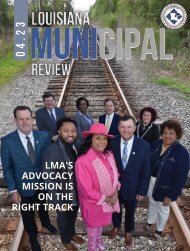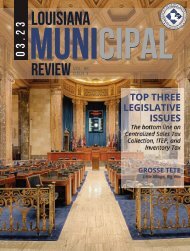LMR JUNE 2021
You also want an ePaper? Increase the reach of your titles
YUMPU automatically turns print PDFs into web optimized ePapers that Google loves.
ral disasters. Anyone that believes we are somehow a fiscally
irresponsible or mismanaged city, come look at our budgets.
Come look at the responsibility and fiscal philosophy of this
city over the last 20 years and you will see someone that has
their house in order.”
This leaves one to wonder if the outstanding fiscal management
of the city and their resiliency somehow mask the desperate
need of individuals, even though city residents, officials,
and leaders have been crystal clear on those profound needs.
It Could Happen to Any City
“These weather events are becoming more frequent and more
ferocious. I understand that climate change is an emotional
topic. You can pick another name for it if you want - call it a
terrible string of bad luck - just look out the window and see
what is happening. I do not know what the City of Lake Charles
could have done differently over the last 20 years to somehow
prevent these weather events from hitting us. All we can do
now is recover to be more resilient with the expectation that
these things could happen again and other cities should have
the same mindset and the same philosophy.
“The City of Lake Charles is geographically positioned the same
way on the Gulf Coast as dozens of other cities in Louisiana and
across other states. It could happen to another community
next year, so I just encourage everyone to be as prepared as
you can. Thank God we did have the reserves that we had and
thank God we have had the fiscal philosophy we have had in
the last 20 years. I don’t know where we would be in the aftermath
of what we have been through had we not had our fiscal
house in order.”
How Long Will It Take?
“Lake Charles will recover,” said Hunter when asked about the
Hurricane Laura – Lesson Learned or Just Noticed?
BY BRETT KRIGER, LMA DEPUTY DIRECTOR FOR DISASTER RECOVERY
Since Hurricane Laura struck south and
west Louisiana, I have received many
calls from mayors and municipal leaders
seeking information and clarification on
FEMA disaster relief programs and how
to ensure maximum reimbursement
from damage repairs. The most common
concern that I have heard repeatedly
from mayors and municipal leaders was
some version of “What can we do about all the debris?” or
“I wish we had had a debris plan.” That is the top concern
after almost every catastrophic disaster and FEMA states that
debris removal accounts for 25-30 percent of the total cost
for storm-related disaster damage.
A catastrophic disaster storm event that affects a large
area, instantly overwhelms communities with vegetative,
construction, and even hazardous debris. Before any useful
short- and long-term future of the city without a swift federal
response. “These were punches to the gut, but we are a very resilient
population. We are going to survive what has happened
to us. The real question is the timeline for that full recovery.
The level of resiliency to which we are able to recover is dependent
on the proper, commensurate federal response.
The housing need alone, just in the city of Lake Charles, is upwards
of $230 million. Our city budget is $80 million a year. We
could shut down city government and offer zero other services
to our constituents for three years and maybe make a dent
in housing here in Lake Charles right now. That is why these
funds are needed for a full resilient recovery, not only for
Lake Charles, but for all of southwest Louisiana.”
What Can We Do?
Local governments statewide should view the plight of Lake
Charles as a cautionary tale about the expediency and efficiency
of federal disaster response. In taking their situation
to heart, we must realize that their struggles are our struggles,
and that meaningful recovery funding for southwest Louisiana
means that every Louisiana citizen benefits. The LMA is committed
to continuing our attempts to keep Lake Charles in the
spotlight and to keep insisting that “soon” is not good enough.
But the individual efforts of our members are also powerful
forces. Nearly every municipal leader has advocacy access
through their state legislators and members of the congressional
delegation. If we join our voices to those of Mayor Hunter,
Lake Charles, and other regional leaders from southwest Louisiana,
we can hopefully eliminate any further delay in the delivery
of promised federal aid, while also sending a message
to Washington that we will unite in solidarity to fight for the
well-being of Louisiana’s municipal governments.
recovery can begin, the initial debris has to be assessed,
organized, and pushed-back from roadways and critical
facilities. The first task to get electric, gas, water and sewer
utilities restored, is to clear the debris from transmission,
distribution, and service paths. Many municipalities
discovered that waiting for the parish to coordinate those
activities could be a slow process based on populationdensity
restoration priorities and first efforts focused on
those municipalities with debris plans in place.
Debris removal is a high priority following a disaster and is a
visible sign of action that helps to restore a sense of normalcy
to the affected population. Removal often represents the
first step toward recovery. The quantity and type of debris
generated, its location, and the size of the area over which
it is dispersed, will have a direct impact on the type of
collection and disposal methods utilized, associated costs,
CONTINUED PAGE 13
Page 12
LMR | JUNE 2021



